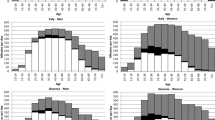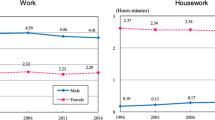Abstract
There are recognised cross-national differences in the average amount and gender division of paid work and unpaid domestic work and care, but country differences between men and women in the timing and intensity of this daily workload remain under-investigated. Using couple-level time-use data from Australia, the UK, Finland, Korea and Spain (n = 1838), we probe cross-national differences in gendered time availability and constraint, focusing particularly on the early evening ‘family rush hour’. We identify daily time periods during which one partner in a fulltime dual-earner parent couple performs routine time-critical household labor and care, whilst the other partner is simultaneously at leisure. In all five countries fathers in dual fulltime earner couples are more likely than mothers to be at leisure whilst their partner does unpaid work, and this disparity occurs most in the early evening. Multivariate analyses reveal the unpaid work-leisure gap is widest in Korea and narrowest in the UK, confounding expectations that social democratic Finland would be most equitable in this measure.



Similar content being viewed by others
Notes
Australia – Australian Bureau of Statistics (ABS) https://www.abs.gov.au/ausstats/abs@.nsf/Lookup/3414.0main+features262011%20(Edition%202);
Spain – Instituto Nacional de Estadística (INe) https://www.ine.es/dyngs/INEbase/en/operacion.htm?c=Estadistica_C&cid=1254736176815&menu=resultados&idp=1254735976608#!tabs-1254736194826;
Korea – Statistics Korea (KOSTAT) https://kostat.go.kr/portal/eng/pressReleases/11/6/index.board?bmode=read&bSeq=&aSeq=273283&pageNo=1&rowNum=10&navCount=10&currPg=&searchInfo=&sTarget=title&sTxt= ;
The UK – NatCen Social Research and deposited by the Centre for Time Use Research (CTUR) at the University of Oxford https://www.timeuse.org/node/10833;
Finland – Statistics Finland https://www.tilastokeskus.fi/meta/til/akay_en.html.
References
Aassve, A., Fuochi, G., & Mencarini, L. (2014). Desperate housework: Relative resources, time availability, economic dependency, and gender ideology across Europe. Journal of Family Issues, 35(8), 1000–1022.
Altintas, E., & Sullivan, O. (2017). Trends in fathers’ contribution to housework and childcare under different welfare policy regimes. Social Politics: International Studies in Gender, State and Society, 24(1), 81–108.
Arts, W., & Gelissen, J. (2002). Three worlds of welfare capitalism or more? A state-of-the-art report. Journal of European Social Policy, 12(2), 137–158.
Arts, W., & Gelissen, J. (2010). Models of the Welfare State. In F. Castles, S. Leibfried, J. Lewis, H. Obinger, & C. Pierson (Eds.), The oxford handbook of the welfare state (pp. 569–583). Oxford: Oxford University Press.
Becker, G. (1965). A theory of the allocation of time. The Economic Journal, 493–517.
Bergmann, B. (2005). The economic emergence of women (2nd ed.). New York: Palgrave MacMillan.
Bianchi, S. (2009). 'What gives‘ when mothers are employed? Parental time allocation in dual- and single-earner two-parent families. In D. R. Crane & E. J. Hill (Eds.), Handbook of families and work: University Press of America.
Bianchi, S., & Milkie, M. (2010). Work and family research in the first decade of the 21st century. Journal of Marriage and Family, 72(3), 705–725.
Bittman, M., & Wajcman, J. (2000). The rush hour: The character of leisure time and gender equity. Social Forces, 79(1), 165–189.
Blair-Loy, M. (2003). Competing devotions: Career and family among women executives. Cambridge, MA: Harvard University Press.
Buddelmeyer, H., Hamermesh, D. S., & Wooden, M. (2018). The stress cost of children on moms and dads. European Economic Review, 109, 148–161.
Burda, M., Hamermesh, D., & Weil, P. (2013). Total Work and gender: Facts and posoible explanations. Journal of Population and Economics, 26(1), 239–261.
Chafetz, J. (2004). Bridging feminist theory and research methodology. Journal of Family Issues, 25, 963–977.
Connell, R. (2009). Accountable conduct: “Doing Gender” in transsexual and political retrospect. Gender and Society, 23(1), 104–111.
Coverman, S. (1985). Explaining husbands' participation in domestic labor. The Sociological Quarterly, 26(1), 81–97.
Craig, L. (2006). Does father care mean fathers share? A comparison of how mothers and fathers in intact families spend time with children. Gender and Society, 20(2), 259–281.
Craig, L., & Brown, J. E. (2017). Feeling rushed: Gendered time quality, work hours, nonstandard work schedules, and spousal crossover. Journal of Marriage and Family, 79(1), 225–242.
Craig, L., & Mullan, K. (2010). Parenthood, gender and work-family time in the United States, Australia, Italy, France, and Denmark. Journal of Marriage and Family, 72(5), 1344–1361.
Craig, L., & Mullan, K. (2011). How mothers and fathers share childcare: A cross-national time-diary comparison. American Sociological Review, 76(6), 834–861.
Craig, L., & Mullan, K. (2013). Parental leisure time: A gender comparison in five countries. Social Politics, 20(3), 329–357.
Crompton, R. (2006). Employment and the family. The reconfiguration of work and family life in contemporary societies. Cambridge: Cambridge University Press.
Crompton, R., & Lyonette, C. (2007). Occupational class, country and the domestic division of labour Women, men, work and family in Europe (pp. 116–132): Springer.
Drago, R. (2007). Striking a balance. Pennsylvania: Dollars and Sense.
Duncan, S., Edwards, R., Reynolds, T., & Alldred, P. (2003). Motherhood, paid work and partnering: values and theories. Work, Employment and Society, 17(2), 309–330.
England, P., & Srivastava, A. (2013). Educational differences in US parents’ time spent in child care: The role of culture and cross-spouse influence. Social Science Research, 42(4), 971–988.
Eurofond., (2012). Fifth European working conditions survey. Luxembourg: Publications Office of the European Union.
EUROSTAT. (2009). Harmonised European time use surveys. Guidelines 2008. Luxembourg: Office for Official Publications of the European Communities.
Fenwick, R., & Tausig, M. (2001). Scheduling stress: Family and health outcomes of shift work and schedule control. American Behavioral Scientist, 44(7), 1179–1198.
Fisher, K., Egerton, M., Gershuny, J. I., & Robinson, J. P. (2007). Gender convergence in the american heritage time use study (AHTUS). Social Indicators Research, 82(1), 1–33.
Folbre, N. (2004). A Theory of the Misallocation of Time. In N. Folbre & M. Bittman (Eds.), Family time: The social organisation of care. New York: Routledge.
Gaunt, R. (2008). Maternal gatekeeping antecedents and consequences. Journal of Family Issues, 29(3), 373–395.
Gershuny, J., & Sullivan, O. (2003). Time use, gender and public policy regimes. Social Politics, 10(2), 205–228.
Gornick, J., & Meyers, M. (2003). Families that work: Policies for reconciling parenthood and employment. New York: Russell Sage.
Hook, J. (2006). Care in context: Men's unpaid work in 20 countries, 1965–2003. American Sociological Review, 71(4), 639–660.
Hook, J. (2010). Gender inequality in the welfare state: Sex segregation in housework, 1965–2003. American Journal Of Sociology, 115(5), 1480–1523.
Jacobs, J., & Gerson, K. (2004). The time divide: Work, family, and gender inequality. Cambridge, Massachusetts: Harvard University Press.
Kwon, H.-J. (2005). Transforming the developmental welfare states in East Asia. New York: Palgrave Macmillan.
Lachance-Grzela, M., & Bouchard, G. (2010). Why do women do the lion's share of housework? A decade of research. Sex Roles, 63, 767–780.
Lee, E. (2005). The politics of the welfare developmentalism in Hong Kong. In H.-J. Kwon (Ed.), Transforming the developmental welfare states in East Asia. New York: Palgrave Macmillan.
Lewis, J. (2009). Work-family balance, gender and policy: Edward Elgar Publishing.
Manser, M., & Brown, M. (1980). Marriage and household decision-making: A bargaining analysis. International Economic Review, 21(1), 31–34.
McDonald, P. (2013). Societal foundations for explaining fertility: Gender equity. Demographic Research, 28, 981–994.
Monna, B., & Gauthier, A. (2008). A review of the literature on the social and economic determinants of parental time. Journal of Family and Economic Issues, 29(4), 634–653.
National Women’s Health Survey. (2019). Fifth edition. Australia: Jean Hailes.
Nelson, J. (2006). Economics for humans Chicago: University of Chicago Press.
Ochiai, E. (2009). Care diamonds and welfare regimes in East and South-East Asian societies: Bridging family and welfare sociology. International Journal of Japanese Sociology, 18, 60–78.
OECD. (2020). Gender wage gap (Indicator): https://doi.org/10.1787/7cee77aa-en (Accessed on 10 February 2020).
Presser, H. (1994). Employment schedules among dual-earner spouses and the division of household labor by gender. American Sociological Review, 348–364.
Presser, H. (2005). Working in a 24/7 economy: Challenges for American families: Russell Sage Foundation.
Presser, H., Gornick, J. C., & Parashar, S. (2008). Gender and nonstandard work hours in 12 European countries. Monthly Labour Review, 131, 83.
Sayer, L. (2016). Trends in Women’s and Men’s Time Use, 1965–2012: Back to the Future? Gender and couple relationships, Volume 6 of the series National Symposium on Family Issues, 43–77.
Sayer, L., Gauthier, A., & Furstenberg, F. (2004). Educational differences in parents' time with children: Cross-national variations. Journal of Marriage and Family, 66(5), 1152–1169.
Shaw, S. M. (2008). Family leisure and changing ideologies of parenthood. Sociology Compass, 2(2), 688–703.
Sintas, J. L., de Francisco, L. R., & Álvarez, E. G. (2015). The nature of leisure revisited: An interpretation of digital leisure. Journal of Leisure Research, 47(1), 79–101.
Sullivan, T. (2014). Greedy institutions, Overwork, and work-life balance. Sociological Inquiry, 84(1), 1–15.
West, C., & Zimmerman, D. (1987). Doing gender. Gender and society, 1(2), 125–151.
West, C., & Zimmerman, D. (2009). Accounting for doing gender. Gender and Society, 23(1), 112–122.
Williams, J. (2010). Reshaping the work-family debate: Why men and class matter. Massachusetts: Harvard University Press.
Funding
This research was supported in part by grants from the Australian Research Council (DP150101282 and FT15010067).
Author information
Authors and Affiliations
Corresponding author
Ethics declarations
Conflict of interest
The authors declare that they have no conflict of interest.
Additional information
Publisher's Note
Springer Nature remains neutral with regard to jurisdictional claims in published maps and institutional affiliations.
Appendix
Appendix
Rights and permissions
About this article
Cite this article
Craig, L., van Tienoven, T.P. Gendered Shares of the Family Rush Hour in Fulltime Dual Earner Families. A Cross National Comparison. Soc Indic Res 153, 385–405 (2021). https://doi.org/10.1007/s11205-020-02489-3
Accepted:
Published:
Issue Date:
DOI: https://doi.org/10.1007/s11205-020-02489-3




